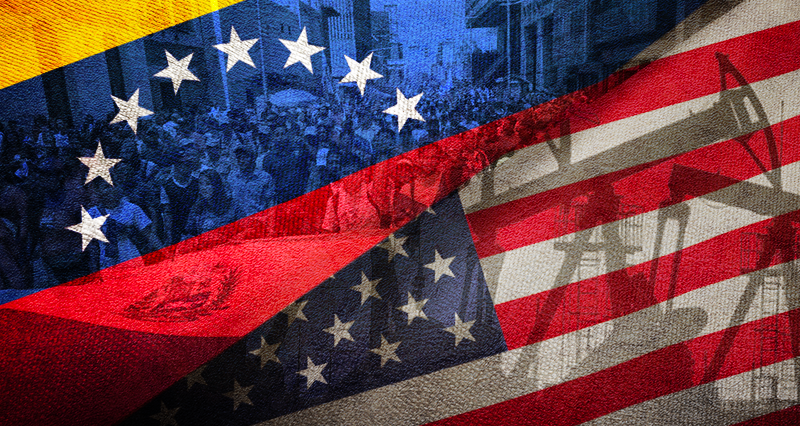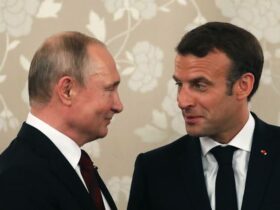By Douglas Bolivar, Caracas / Venezuela
The agenda of what was discussed on March 5 between the Chavista leadership and President Biden’s envoy to Caracas is of absolute ignorance of the country’s political spokesmen, which by default gives credibility to the facts.
On March 5, the national government of Venezuela commemorated the ninth year of the death of President Hugo Chávez with a series of activities remembering his colossal performance at the head of the Venezuelan State between 1999 and 2012.
That very same day, a step was taken that could constitute a milestone in the history of commercial and diplomatic relations in the world order: a delegation from the highest level of the Washington government, headed by Juan González, was present in Caracas with the aim of establishing a connection to the governmental leadership of Venezuela. Their aim was to set on the path of undoing the economic sanctions that since 2014 were imposed on the management of Maduro, who has since gone through an ordeal to avoid an insurmountable collapse of the country’s economy.
History does not record that the United States has made a complete lifting of sanctions on any country. And although on March 5, it was only revealed that talks were just beginning, this revelation left the political class stunned and disoriented.
“After a long time they (rulers of the United States) have grasped the message that we have sent to them loudly,” deputy Diosdado Cabello editorialized in his program “Con el mazo dar“, which broadcasts every Wednesday on the state channel Venezolana de Televisión.
Cabello, who is national vice president of the United Socialist Party of Venezuela (PSUV), which leads the Chavista electoral alliance called the Great Patriotic Pole, even exhibited a powerful piece of information: “The one who requested the meeting was the president of the United States. President Nicolás Maduro then gathered the political high command to evaluate and decide. No one is here to give up,” he asserted.
“They talked about many things. There is no need to for desperation. These are conversations and we have to see how far they go. That was in the coming, sooner or later it was going to happen,” Cabello continued in a revealing tone.
And he immediately posed a challenge that has since orbited over Venezuelan politics: no one knows for sure what the agenda of the March 5 meeting was.
“None of the oppositional politicians know what they talked about, they do not know about the statements of President Nicolás Maduro and the representatives of the United States.”
“The United States government surprised them all,” he said about the anti-Chavista spokesmen protected by Washington.
“A lifting of the sanctions is coming”
Indeed, Deputy Cabello’s statement is pertinent, since in Venezuelan political circles only generalities and good expectations on a potential agreement are discussed, which they do not deny. But no one has a confirmed knowledge.
“No major things have been said because it is important to keep it that way,” Member of Parliament Melva Paredes, one of the leaders of the Cambiemos party in opposition to the Maduro government told UWI.
“A lifting of sanctions is coming,” she affirms without a hint of doubt, but also without any clear orientation.
“I see this rapprochement as opportune. Venezuela needs a normalization of daily life for the citizens,” said Deputy Paredes.
“It is time to strengthen ties with the United States because that also softens relations with Colombia, where the majority of Venezuelan migrants are found. This will affect the normalization of relations with all of Latin America”, Paredes concluded.
Venezuela in international geopolitics
Jesús Santander was elected to the national assembly as a deputy from the state of Carabobo for the PSUV within the alliance of the Patriotic Pole. However, in recent months he stareted working within the Podemos party, which has a close alliance to the PSUV government.
“The refineries of the United States are prepared to receive heavy oil from Venezuela,” Santander argues about the motivations of the United States for its turn with respect to Venezuela.
“In international geopolitics, Venezuela is exactly that: a safe supplier of oil.”
“The United States has authorized Chevron to increase production. That means interest in normalizing relations with President Maduro.”
“There is a recognition of the constitutionality of Venezuela and President Maduro,” says Santander.
José Antonio España has a long history as a progressive politician. But a mistake made him a deputy representing Primero Justicia, a party of the extreme right.
For years he was secretary general of the Movement for Socialism (MAS) and resigned before the 2015 parliamentary elections to become a candidate for Primero Justicia for the state of Delta Amacuro, where he was elected.
In 2020, he ran for re-election for that state with the endorsement of the Democratic Alliance and his aspirations were frustrated. Today he has accelerated rapprochement with the PSUV.
“We are in the presence of the new multipolar scheme of the world,” he says analyzing what happened in Caracas on March 5.
“It is a new geopolitical reality in front of which a rearrangement of the world’s map takes place. The war (Russia-Ukraine) triggers and accelerates this new phase”, he says.
España mentions that the situation in Ukraine not only pushes the United States to reorient itself on Venezuela. Additionally, it also provides a correct understanding that the alliance between China and Russia “takes over the new scene of the scheme, opens a new stage in the world.”
In addition, adds España, the predictability of the results of the upcoming elections in Colombia and Brazil forces the United States to capitulate in its proposals with respect to Venezuela.
“The elections in Colombia open up a new reality and the United States would have a very bad role as bumper car (a provocateur) in the face of this new reality.”
“There is a decision to resume relations and to do it gradually: air flights, opening consulates, regularizing migratory movements. This has been all been talked about,”says España.
Carlos Melo is a legendary parliamentarian from the pre-Chávez left. In recent years, he has acted inconsistently with his career, although he has distanced himself from Chavismo several years ago. He is the founder of La Causa R, alongside Aristóbulo Istúriz.
“I hope that it is a correction of the course of the United States with respect to blockades and sanctions,” he says in his office in the Permanent Commission on Science and Technology of the National Assembly.
“They believe that subjecting the population to hardship makes governments fall, but that has been a great failure, with very few successful results. It is a mistake of the United States against any country”.
“They are very incipient and are related to lifting sanctions. They have debated the position of Venezuela with respect to Russia”, Melo assumes.
Also with extensive experience in all fields, Rodolfo Sanz states: “The expectations are of the same dimension as the availability of the United States to reach an agreement with Venezuela not only for a reliable supply of fuel and eventual gasoline.”
Sanz, Chavez’ former Minister of Industry, of whom he was also deputy foreign minister (he was also mayor of a municipality in Miranda state and is known as a totem of the efforts of Diosdado Cabello and Héctor Rodríguez as rulers of this state neighboring Caracas), says that the prudent thing is to keep the best expectations.
“That will allow us to return to international financing markets and recover the industry.”
“We are not a threat to the United States and hopefully, sanity returns to reestablish relations in the best conditions.”
“Sanctions have not been successful against Venezuela and indeed against any country. The United States is understanding that sanctions are meaningless, that in the end they are inefficient and inoffensive.”
“It is not a political issue but one of convenience, of pragmatism”, concludes Sanz.

















Leave a Reply